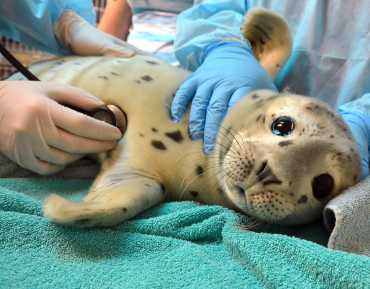
Record Number of Animals Admitted During Our Busiest Season Ever
- Domoic acid
- Malnutrition
The Marine Mammal Center has admitted more patients already this year than ever before—and we need 1,000 pounds of fish per day to feed all of these hungry pups.
This is a record-breaking week at The Marine Mammal Center. So far this year, we have admitted 366 patients—the most we’ve ever admitted this early in our busy season. And that number is only going to grow.
As of publishing, we have a total of 195 animals in our care, including 183 patients at our hospital in Sausalito, with the remaining animals at our satellite facilities in San Luis Obispo and Monterey or in transport between those facilities and our headquarters. Stay updated on our most current patient numbers.
Here’s the breakdown of the animals currently admitted at our hospital:
Right now, we’re using 1,000 pounds of fish every day to feed this record-breaking number of animals. You can help feed our animals by supporting our Dollar-a-Pound campaign.
Learn More About the Species in Our Care
{"image":"\/Animals\/Wild\/Elephant seal\/elephant-seal-bull-shutterstock.jpg","alt":"northern elephant seal bull laying on beach","label":"Pinnipeds","title":"Northern Elephant Seal","link_url":"\/animal-care\/learn-about-marine-mammals\/pinnipeds\/northern-elephant-seal","type":"page"}

{"image":"\/Animals\/Wild\/California sea lion\/csl-underwater-shutterstock.jpg","alt":"California sea lion underwater","label":"Pinnipeds","title":"California Sea Lion","link_url":"\/animal-care\/learn-about-marine-mammals\/pinnipeds\/california-sea-lion","type":"page"}

{"image":"\/Animals\/Wild\/Harbor seal\/harbor-seals-shutterstock.jpg","alt":"","label":"Pinnipeds","title":"Pacific Harbor Seal","link_url":"\/animal-care\/learn-about-marine-mammals\/pinnipeds\/pacific-harbor-seal","type":"page"}

{"image":"\/Animals\/Patients\/Guadalupe fur seals\/2018\/gfs-snaggle-by-dana-angus-c-the-marine-mammal-center-noaa-permit-18786.jpg","alt":"Guadalupe fur seal patient Snaggle","label":"Pinnipeds","title":"Guadalupe Fur Seal","link_url":"\/animal-care\/learn-about-marine-mammals\/pinnipeds\/guadalupe-fur-seal","type":"page"}

Over the weekend, we even burned out two fish grinders—used to make the fish smoothies needed to feed many of our young animals that can't eat whole fish—and had to scramble to buy a new one before running out of fish formula!
This time of year is always busy for the Center, but we are seeing even more patients than usual. This is peak elephant seal pup season, as the babies born earlier this year have been weaned from their mothers and must learn how to forage for food.
But we’ve also seen an influx of sea lion pups that were separated too early from their mothers and are struggling to survive on their own.
And harbor seal pup season is just starting to get busy as well. These are the youngest and most vulnerable pups we care for—some arriving at our hospital just days after birth because they’ve been somehow separated from their mothers.
During their rehabilitation here, all of these pups will learn how to catch fish and must grow big and strong. Once our veterinary experts determine the pups are healthy enough, we’ll release them back to their ocean home.
But it’s not just pups we’re caring for right now. We also have some large adult sea lions on-site. Many of these animals have been affected by a large persistent algal bloom in Monterey Bay with high levels of the neurotoxin domoic acid found in the water, mussels and fish in the area. This has an effect on people too—the California Department of Public Health has warned people not eat seafood from these areas.
No matter the size, age or diagnosis of our patients, they all need to eat. And at about $1 a pound, our fish bills are getting expensive! You can help ensure that our record-breaking number of patients get all the fish they need to get a second chance at life.
Yes, I want to save a life!

Yes, I want to save a life!
You’ll be giving sick and injured animals the best possible care at the Center’s state-of-the-art hospital. With your gift today, you are giving a patient a second chance at life in the wild.
See Our Latest News
{"image":"\/Animals\/Wild\/Gray whale\/cropped-images\/two-gray-whales-golden-gate-bridge-shutterstock-0-0-1270-992-1770234810.jpg","alt":"two gray whales under the Golden Gate Bridge","title":"The Marine Mammal Center and San Francisco Harbor Safety Committee Pilot New Vessel Operator Training Program","link_url":"https:\/\/www.marinemammalcenter.org\/news\/the-marine-mammal-center-and-san-francisco-harbor-safety-committee-pilot-new-vessel-operator-training-program","label":"Press Release","date":"2026-02-06 01:00:00"}

The Marine Mammal Center and San Francisco Harbor Safety Committee Pilot New Vessel Operator Training Program
February 6, 2026
Read More{"image":"\/Animals\/Wild\/Bottlenose dolphin\/cropped-images\/dolphinphoto-by-adam-li-c-noaa-0-0-1270-992-1769539954.jpg","alt":"A bottlenose dolphin jumps out of the water.","title":"What\u2019s the Difference Between Dolphins and Porpoises? And Other Animal Trivia","link_url":"https:\/\/www.marinemammalcenter.org\/news\/whats-the-difference-between-dolphins-and-porpoises-and-other-animal-trivia","label":"News Update","date":"2026-01-26 23:00:00"}

What’s the Difference Between Dolphins and Porpoises? And Other Animal Trivia
January 26, 2026
Read More{"image":"\/Animals\/Patients\/Sea otters\/2025\/cropped-images\/so-mooring-release-2-laurie-miller-c-the-marine-mammal-center-USFWS-permit-MA101713-1-147-8-1270-992-1770307740.jpg","alt":"Sea otter - Mooring","title":"Rescue Stories: Southern Sea Otter Mooring Named the 2025 Patient of the Year","link_url":"https:\/\/www.marinemammalcenter.org\/news\/rescue-stories-vote-for-your-favorite-marine-mammal-patient-of-2025","label":"News Update","date":"2026-01-16 10:05:08"}

Rescue Stories: Southern Sea Otter Mooring Named the 2025 Patient of the Year
January 16, 2026
Read More{"image":"\/People\/Action\/Veterinary care\/cropped-images\/Harris_Green turtle_TMMC-0-0-1270-992-1767649941.jpg","alt":"Heather Harris","title":"Seattle Aquarium Awards Dr. Heather Harris With Prestigious Conservation Research Award","link_url":"https:\/\/www.marinemammalcenter.org\/news\/seattle-aquarium-awards-dr-heather-harris-with-prestigious-conservation-research-award","label":"In the News","date":"2026-01-05 04:48:00"}

Seattle Aquarium Awards Dr. Heather Harris With Prestigious Conservation Research Award
January 5, 2026
Read More